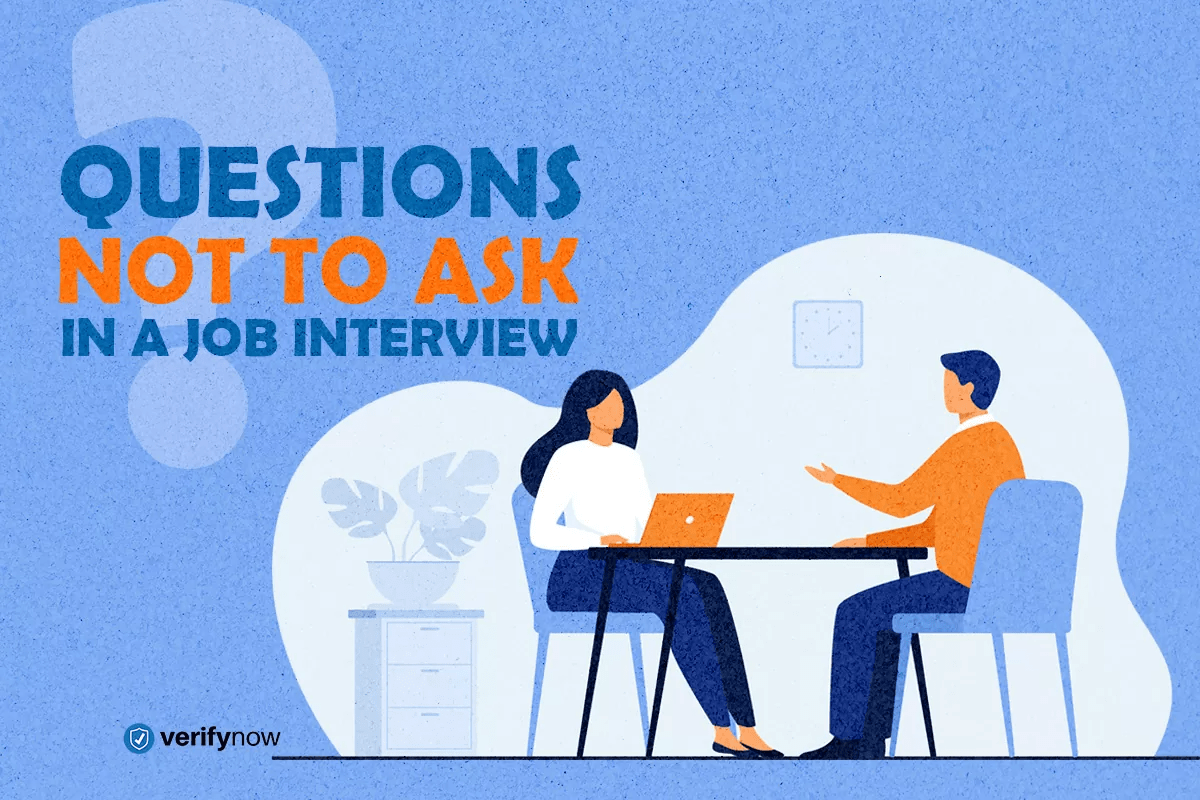As interviewers, we all know the importance of asking the right questions when evaluating potential candidates for a job. A well-crafted set of questions can help us gain insight into a candidate’s skills, experience, and personality, which are crucial for making informed hiring decisions.
However, while we often hear about the questions you should ask during interviews, it’s equally important to know what questions to steer clear of.
Not all questions are appropriate to ask during an interview. For example, some questions can be discriminatory and have legal implications for the interviewer and the organisation.
So, in this blog, we will discuss some of the questions you should avoid asking during interviews to prevent discrimination and ensure fair hiring practices.
1. What is Your Cultural Background?
Asking a candidate about their cultural background is not an appropriate question to ask during an interview. It is considered illegal under the Racial Discrimination Act 1975 in Australia, which prohibits discrimination based on race, colour, descent, or national/ethnic origin.
Even if the intention behind asking such a question is to understand a candidate’s cultural heritage or language proficiency, a candidate may consider it discriminatory and can result in legal implications for the interviewer and the organisation (especially if you don’t end up hiring this candidate).
Only a few exceptions to this rule, such as “Identified Positions”, require a candidate from a specific cultural background, such as an Aboriginal or Torres Strait Islander person. However, these exceptions are also limited and specific to the job requirements.
However, you can ask candidates if they have the right to work in Australia and request evidence to ensure they are legally allowed to work there.
You may be interested in reading: Visa Entitlement Verification Online (VEVO) Checks: The Ultimate Guide.
2. Are You Pregnant or Planning on Becoming Pregnant?
Employers should avoid asking candidates whether they are pregnant or planning to become pregnant during the interview process because it’s an example of “direct discrimination” and is unlawful under the Sex Discrimination Act 1984, the Fair Work Act 2009, and State-based legislation.
This kind of question can create negative assumptions about a pregnant woman, including that she may be a burden or unreliable in the workplace.
As an employer, you should focus on assessing a candidate’s qualifications, skills, and ability to perform the job rather than their pregnancy status or plans to start a family. However, even if you have the best intentions, asking such questions can make a candidate feel discriminated against and uncomfortable during the interview process.
Not to mention, if you don’t hire them, they may assume it was a direct result of their pregnancy, and then you can find yourself in hot water.
3. Do You Find Me Attractive?
Asking a candidate if they find the interviewer attractive is completely inappropriate and unprofessional. In addition, it could create an uncomfortable or even hostile environment for the candidate, making them feel uneasy and vulnerable.
This question is also irrelevant to the job and has no bearing on the candidate’s qualifications or ability to perform the role. The candidate may also consider this a form of sexual harassment, which can result in serious legal implications for the interviewer and the company.
Beyond asking this question, engaging in common flirting behaviours such as complimenting the candidate’s attire or appearance, staring, winking, making sexually suggestive comments or jokes, inquiring about social activities outside of work, asking about the candidate’s relationship or marital status, or physical touching can all constitute problematic and inappropriate conduct during an interview, regardless of whether someone asks this question.
4. Do You Have a Disability?
Asking a job candidate if they have a disability during an interview could be inappropriate for various reasons. For one, it could be perceived as discriminatory, as it may suggest that a person’s disability is a factor in whether or not they are suitable for the job. Additionally, it could be seen as irrelevant to the job requirements and may discourage otherwise qualified candidates from pursuing the position.
In Australia, the Disability Discrimination Act makes it illegal to discriminate against someone on the basis of disability in employment. This includes direct and indirect discrimination and discrimination based on assumptions about a person’s abilities or limitations.
Therefore, asking a job candidate about their disability could potentially be considered a violation of this law.
However, there are certain circumstances where it may be appropriate to ask a job candidate about their disability, provided it is phrased diplomatically and relates directly to the inherent requirements of the job. For example, if the job involves physical tasks that may be difficult for someone with a particular disability, it may be appropriate to ask if they require any accommodations or if any limitations may affect their ability to perform the job duties.
So, let’s say the job involves working at heights; an employer may need to ask a candidate if they have a disability that might affect their balance or coordination, which could make it unsafe for them to work at heights.
Another diplomatic way to phrase the question could be, “Can you perform all of the essential duties of this job with or without reasonable accommodations?” This question not only acknowledges the possibility of accommodations but also focuses on the specific requirements of the job rather than the candidate’s disability.
5. What is Your Religion?
Asking a job candidate about their religion during an interview is generally considered inappropriate and potentially discriminatory. Asking about a candidate’s religion can also be seen as an invasion of privacy and creating a hostile work environment.
Religion is a personal matter, and a candidate’s religious beliefs should not be relevant to their ability to perform the job.
And in Australia, it is illegal for employers to discriminate against employees or job candidates based on their religion.
The Fair Work Act prohibits discrimination against employees and prospective employees based on religion. Additionally, several states and territories in Australia have anti-discrimination legislation that protects applicants against discrimination.
Even if the job is with a religious institution, asking about the candidate’s religion during an interview is still inappropriate.
For example, in the Craig Campbell case, the court found that a religious school had unlawfully discriminated against a teacher because of his homosexuality. The court held that the religious exemptions in anti-discrimination laws did not permit the school to discriminate against the teacher based on his sexual orientation.
6. Are You Married or in a Relationship?
Asking a job candidate about their marital or relationship status during an interview can be seen as discriminatory as it is a personal characteristic that has no bearing on the candidate’s ability to perform the job. And in many countries, including Australia, it is illegal to include this line of question during the hiring process.
The candidate may also view this line of questioning as intrusive and potentially biassing the interviewer’s perception of them.
For instance, asking a female candidate about their marital status may lead to discrimination as the interviewer may assume that a married woman or a woman in a relationship may not be as committed to their job as a single woman.
Similarly, asking a male candidate about their relationship status may lead to discrimination if the interviewer assumes that a single man may be more available for overtime or relocation.
Overall, employers should refrain from asking questions about a candidate’s marital or relationship status during the interview process to avoid any potential discrimination and to ensure that the hiring process is fair and objective.
7. How Old Are You?
Asking “how old are you?” during a job interview is not only inappropriate, but it’s also illegal in Australia. Age discrimination is prohibited by the Age Discrimination Act 2004, making it against the law to discriminate against someone based on their age regarding employment.
Therefore, asking someone’s age could be seen as a form of discrimination and could hurt your chances of securing the candidate. Or it could also open up the doors for a potential discrimination lawsuit – especially if you choose not to hire the candidate.
Example
Mark, who is 35 years old, applies for a software development company. The job requirements include strong coding skills and experience with specific programming languages. The interviewer asks Mark about his age, claiming they want to know more about his background. In this case, asking about Mark’s age is irrelevant.
There may be exceptions to the rule of not asking about a candidate’s age during an interview. Sometimes, a person’s age may be relevant to their ability to perform the job’s inherent requirements.
You should, however, frame the questions around the candidate’s ability to perform specific job-related tasks or duties rather than their age.
Example
Samantha, who is 16 years old, applies for a server job in a restaurant serving alcohol. As the legal drinking age in Australia is 18, it is a legal requirement for employees working with alcohol to be at least 18 years old. Therefore, in this case, it would not be discriminatory for Samantha to be refused employment due to her age, as her age prevents her from meeting the inherent requirements of the job.
8. What is Your Current Salary?
Inquiring about an interviewee’s current salary is generally discouraged due to its potential to put employees who are already underpaid, often women, at a disadvantage and further perpetuate the gender wage gap.
Even if these individuals possess the necessary skills and experience to command a higher salary in the current market, revealing a lower salary may lead employers to undervalue their worth.
While it is not illegal to ask about current salary, discussing salary expectations is a critical and equitable aspect of the interview process. A more suitable question to pose would be, “What are your salary expectations?”
Key Takeaways
Employers should be mindful of the questions they ask during an interview to avoid any discriminatory practices. You should avoid asking questions that could lead to discrimination and ensure that you follow fair hiring practices.
If you refrain from asking these questions, you can create a more diverse and inclusive workplace that values all employees equally. Employers must take a proactive approach towards avoiding discriminatory practices during the interview process, especially as society continues to strive for greater equality.
This approach can attract the best candidates for the job, improve company culture, and foster a more productive and successful business.
It’s worth noting that the interview is just one part of the hiring process, and background screening is equally crucial. Background checks help ensure you hire qualified and trustworthy candidates and can reveal red flags you might have missed during the interview process.
At Accurate Background, we provide comprehensive background screening services to help you make informed hiring decisions.
Contact us today to learn more about our background screening services.



